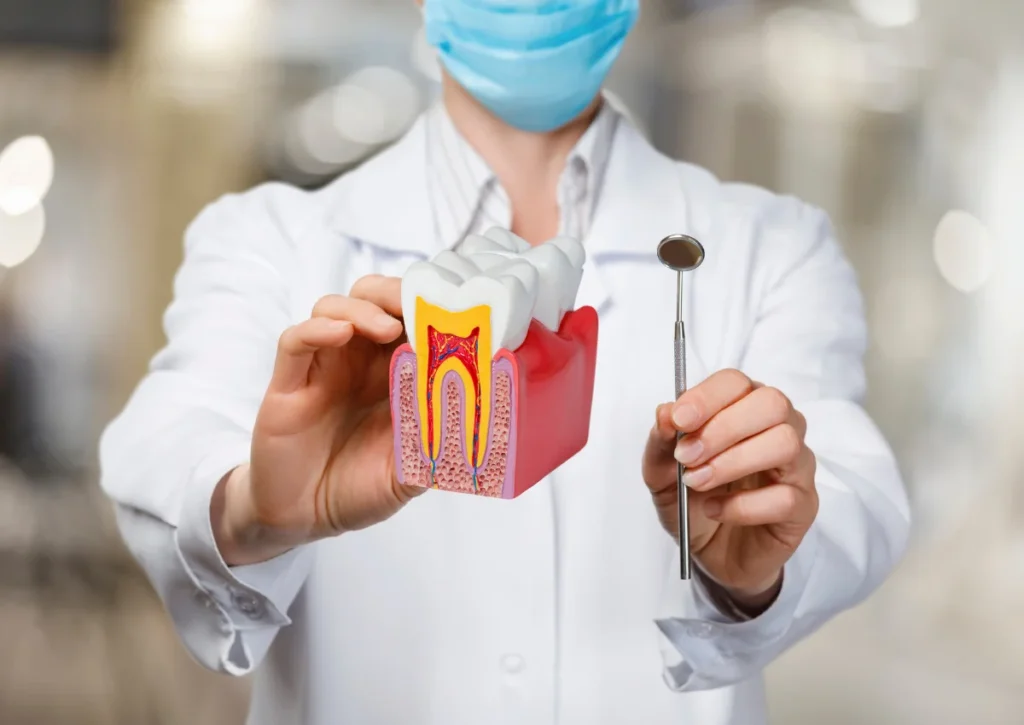Our Services
Painless Single Sitting Root Canal

Single sitting painless root canal treatment is a modern dental procedure designed to effectively treat infected or damaged teeth in just one visit, minimizing discomfort and inconvenience for the patient. Using advanced techniques and equipment, such as rotary instruments and local anesthesia, dentists remove infected tissue, clean the root canal system thoroughly, and seal it to prevent further infection.
This streamlined approach eliminates the need for multiple appointments, reducing treatment time and enhancing patient comfort. The use of cutting-edge technology and anesthesia ensures a painless experience during the procedure. With single sitting painless root canal treatment, patients can expect efficient and effective resolution of their dental issues, allowing them to quickly return to their daily activities with a restored and healthy smile.
Root Canal Procedure
Single sitting root canal procedure, also known as "single-visit" or "one-appointment" root canal treatment, offers a streamlined approach to addressing infected or damaged tooth pulp in a single dental visit. Here's an overview of the procedure:
1) Initial Assessment: The process begins with a thorough examination, often involving X-rays, to assess the extent of the infection or damage to the tooth pulp.
2) Anesthesia and Access: Local anesthesia is administered to ensure the patient's comfort throughout the procedure. Once the area is numb, the dentist creates a small opening in the crown of the tooth to access the infected or damaged pulp.
3) Cleaning and Shaping: Using specialized instruments, the dentist carefully removes the infected or damaged pulp from the tooth's root canals. The canals are then cleaned, shaped, and disinfected to remove any remaining bacteria and debris.
4) Filling and Sealing: After thorough cleaning, the dentist fills the root canals with a biocompatible material called gutta-percha to seal them and prevent recontamination. The opening in the crown of the tooth is then sealed with a temporary or permanent filling.
5) Restoration: In some cases, a restoration such as a dental crown may be placed to strengthen and protect the tooth, especially if significant tooth structure has been lost due to decay or damage. This step may be completed during the same appointment or at a later date, depending on the individual case.
6) Post-Procedure Care: Patients are provided with instructions for post-procedure care, which may include avoiding certain foods or activities to promote healing and prevent complications. Over-the-counter pain medication may be recommended to manage any discomfort or swelling.
7) Follow-Up Appointment: Depending on the recommendation and the complexity of the case, a follow-up appointment may be scheduled to evaluate the success of the procedure and ensure the tooth is healing properly.
7 Signs that indicate should get a Root Canal Treatment
Several signs and symptoms may indicate the need for a root canal procedure. It's essential to consult with a dentist if you experience any of the following:
1) Severe Tooth Pain: Persistent or intense pain in a specific tooth, especially when biting or applying pressure, can indicate nerve damage or infection within the tooth pulp.
2) Sensitivity to Temperature: Sensitivity to hot or cold foods and beverages that linger even after the stimulus is removed may signal nerve damage or infection in the tooth.
3) Swelling or Tenderness: Swelling, tenderness, or a pimple-like bump on the gums near the affected tooth may indicate the presence of an abscess or infection.
4) Discoloration of the Tooth: Darkening or discoloration of the tooth, particularly if it is accompanied by pain or sensitivity, may indicate decay or damage to the tooth pulp.
5) Prolonged Tooth Sensitivity: Sensitivity to touch or pressure that persists for an extended period, even after the initial stimulus is removed, can be a sign of nerve or pulp damage.
6) Gum Recession: Receding gums around a specific tooth, accompanied by pain or sensitivity, may indicate underlying issues requiring root canal treatment.
7) Persistent Bad Breath: Chronic bad breath or a foul taste in the mouth, particularly if it is localized to a specific tooth, maybe a sign of infection or decay within the tooth.
if you experience any of these signs or symptoms, it's essential to schedule an appointment with a dentist for a thorough evaluation and proper diagnosis. Early intervention can help prevent further complications and preserve the health of your teeth.
Why Visit an Endodontist ?
Endodontists are called dentist, but all dentists are not endodontists.
When a dentist gets specific training for conservative restorative treatment of teeth like smile makeover treatment, painless single visit root canal treatment, diagnosing tooth pain and provides advanced technology-based high-quality treatment for saving teeth, he or she is called an Endodontist.
Endodontists (Root Canal Specialists) are specialists in saving teeth by doing root canals and various complex procedures, thereby helping you maintain your natural teeth and smile for a lifetime.Their advanced Postgraduate training, specialized skills and techniques, mean you get the highest quality care with the best result — saving your natural teeth.
A common misconception is that a root canal is a painful procedure which require multiple sittings. Actually, root canals are completely painless and can be completed in just a single sitting when performed with correct technique.
Visit "The Smile Centre Dental Clinic" to get your root canal done in 1 visit by our Inhouse Endodontist and experience painless dentistry.
Frequently Asked Questions
Yes, root canal treatment can be highly effective in resolving tooth infections, alleviating pain, and saving the natural tooth. However, the success of the procedure depends on thorough cleaning and disinfection of the root canals, as well as proper sealing to prevent reinfection.
Book An Appointment
Please feel free to contact us if you have any questions about our services or to schedule an appointment.